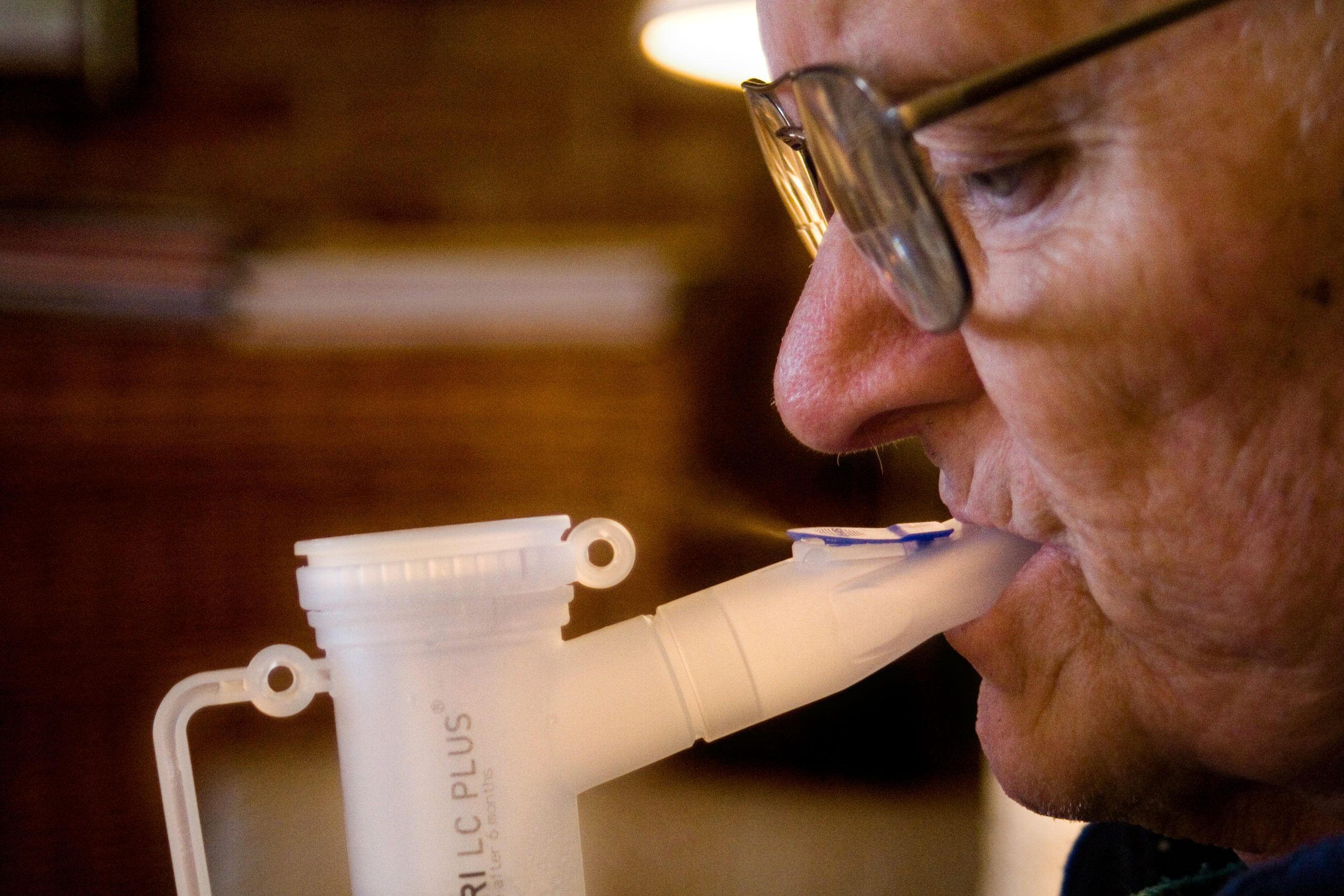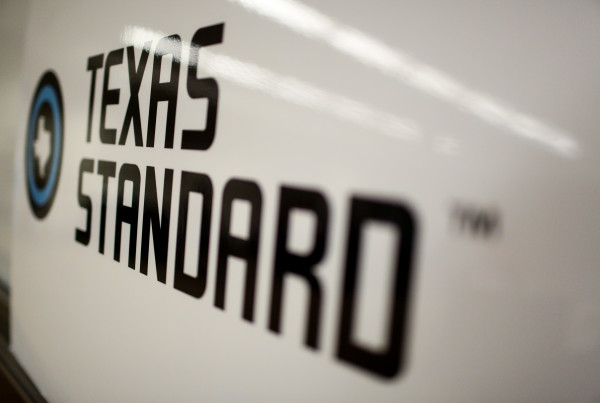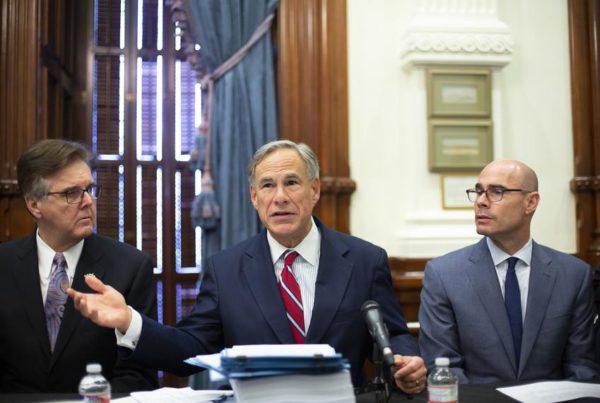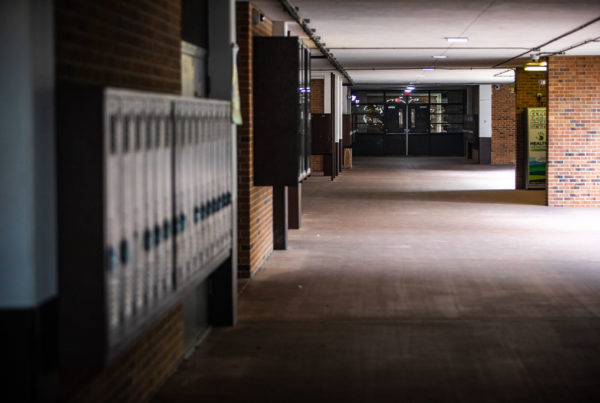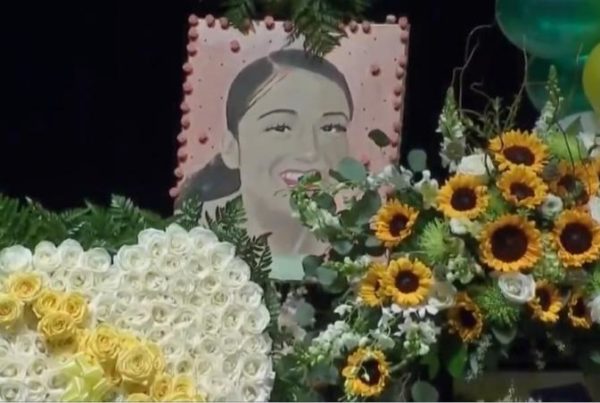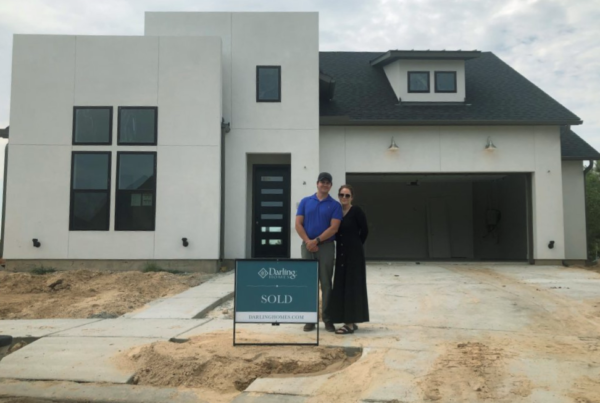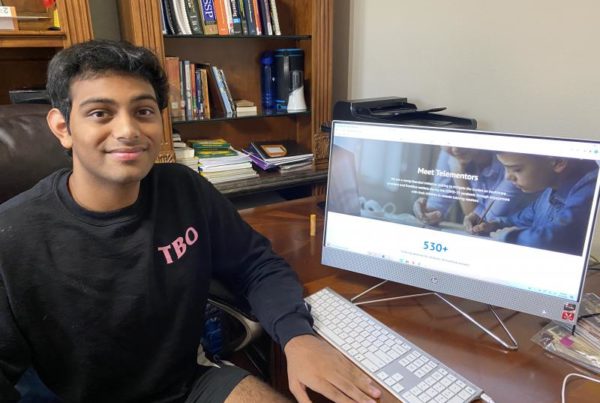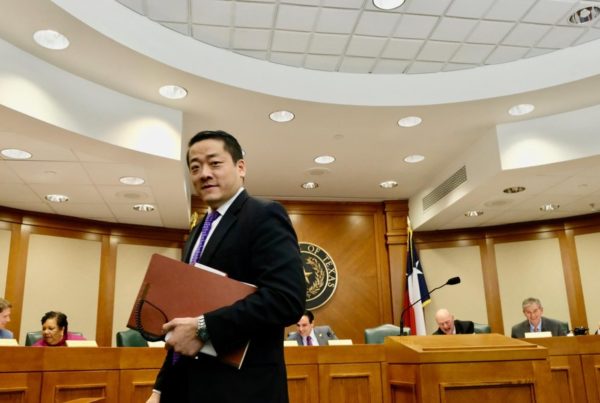One night in late June, while his wife and children slept, Javier Bejarano typed out his will. Bejarano, a contractor from Odessa, had contracted COVID-19. He could barely breathe, his lungs had become so inflamed from the virus.
“I couldn’t sleep,” Bejarano said. “I was afraid to go to sleep because I was afraid I wasn’t going to wake up.”
He was scared, unsure of what would happen to him and his family. He was just about to go to the emergency room, when he reached out to a friend of his, who connected him with Dr. Richard Bartlett, a west Texas physician.
Bejarano had seen Dr. Bartlett give interviews about a treatment for COVID-19 that he called the “COVID silver bullet.” The main component was a drug called budesonide: an asthma medication taken through an inhaler or a nebulizer.
Dr. Bartlett prescribed budesonide to Bejarano. The relief was immediate.
“When you’re breathing that stuff in man, it’s like a goodness,” Bejarano said. “I finally felt like I could breathe. I could sleep at night.”
“We Have Cracked The Code”
Dr. Bartlett has been prescribing budesonide to coronavirus patients for months. It’s an old, proven medication that’s relatively inexpensive and readily available. He said he stumbled upon the idea to use budesonide for COVID patients during an emergency room shift in March.
“I laid down for a cat nap between patients. I woke up convinced that God had given me a winning strategy. And a week later I had to try it out on my first two patients, and for every patient it’s working,” Bartlett said on streaming talk show America, Can We Talk?
Dr. Bartlett works at an emergency clinic in Lubbock, and has privileges at three hospitals in west Texas, according to the Texas Medical Board. When asked, he didn’t say exactly how many people he’s treated, but he estimated that he and other doctors have prescribed budesonide to over 400 patients.
“My focus right now is not on tabulating numbers, my focus is not on curves and waves. My focus is on real Americans who need life-saving measures,” he said.
In addition to budesonide, Dr. Bartlett prescribes zinc, aspirin, and clarithromycin, which prevents bacterial infection. But the budesonide, he says, is the key.
The idea behind Dr. Bartlett’s treatment is to target inflammation in the lungs caused by the body’s response to COVID-19. In its fight against the virus, the body’s immune system can get out of control – like a runaway train – and cause inflammation in the lungs. Budesonide is anti-inflammatory that targets the lungs. Inhaling the steroid effectively slams on the immune system’s breaks. The earlier you take it, the better.
For the past few months, Dr. Bartlett’s been an evangelist for budesonide. He started a website for the treatment called covidsilverbullet.com. He’s also given over 20 interviews on the subject, from local radio, to podcasts, to conservative cable network One America News, to streaming shows like Victuras Libertas, which was removed from YouTube for violating its terms of use. The message in each interview is similar:
“We have cracked the code,” Dr. Bartlett said in one of his appearances on America, Can We Talk? “We have an answer for this. We don’t need another answer. We have an answer.”
That message is getting out there.
Dr. Bartlett’s first appearance on ‘America Can We Talk’ had millions of views on YouTube. Representative Louie Gohmert, a Republican from east Texas who contracted the coronavirus, mentioned Dr. Bartlett and budesonide in an interview about his treatment. The drug also came up during a taped Q&A between Matthew McConaughey Dr. Anthony Fauci last week.
“You know, there are people that believe that budesonide and taking zinc is working [against the coronavirus]. Is there any downside to doing it?” McConaughey asked.
“You know, there’s a placebo effect to make you feel better, and less anxious, but in reality, Matthew, it doesn’t have any effect,” said Fauci.
An Untested Treatment
As much as Dr. Bartlett has talked budesonide up as a silver bullet, as much as patients like Bejarano swear that it saved their life, there’s no evidence from clinical trials to prove that it works for COVID patients.
Some physicians think it’s dangerous to call a drug a silver bullet when it hasn’t even been tested for the virus.
“I think if you ask a lot of different doctors, I think most would say that when we hear about a silver bullet treatment, I think our ears perk up but not necessarily in the way of ‘Oh I can’t wait to get my hands on that,’” said Doctor Anoop Nambiar, an associate professor of medicine at the University of Texas Health Science Center in San Antonio, and a pulmonologist at the South Texas Veterans Administration hospital.
Clinical trials typically include hundreds or thousands of patients. The case study Dr. Bartlett published on his website includes two patients.
“The last thing I want to do for a patient of mine is give them a treatment for which I cannot say with certainty how much does it truly help, but then also be aware that it can hurt somebody and make them worse,” said Dr. Nambiar.
Other physicians said they wouldn’t use budesonide unless it had been fully vetted for COVID, regardless of anecdotal evidence. Dr. Bartlett said he’s not worried about those concerns.
He said his patients’ results show that the treatment works, and that countries with few COVID-related deaths like Taiwan and Japan can trace their success back to inhaled corticosteroids – not government-mandated mask wearing and social distancing. But there’s little evidence to support this.
Dr. Bartlett also defended the drug by pointing to trials that are happening right now, where physicians are testing budesonide and similar drugs for COVID patients.
One of them is being conducted by the Universities of Oxford and Queensland – and it may show some promise. The trial will test inhaled budesonide on about 500 coronavirus patients to test whether the steroid can mitigate the virus’ respiratory symptoms. One of the researchers, Dan Nicolau, a physician and professor of mathematics at the University of Oxford, is confident the drug will help.
“Almost no matter how you look at it, it’s difficult to see a version of the future where this does not turn out to be helpful,” Dr. Nicolau said.
In fact, from the research Dr. Nicoulau’s done so far, he’s confident that the question is not whether budesonide will help, but how much.
“There’s a big difference if we keep 10 percent of people out of hospital versus 60 percent. Both would be useful, but if we keep 60 percent of people out of hospital, then, well, that’s the kind of thing we throw a barbecue over,” said Dr. Nicolau.
Dr. Nicolau expects to complete the study this fall. He thinks the data will show that budesonide is a useful tool to help COVID patients – but not at the exclusion of social distancing, or a vaccine. A trusty socket wrench, if not a silver bullet.
“It’s Enough For Me”
In the meantime, some healthcare providers are following Dr. Bartlett’s lead, even without a full clinical trial. Andrea Malcolm is a nurse anesthesiologist at Frio Regional Hospital, about an hour south of San Antonio. In late June and early July, the hospital’s 25 beds started to fill up with COVID patients. Some just wouldn’t get better.
“Sometimes they would be there for six, seven days, and kind of look the same, and then all of a sudden they would just start going down,” Malcolm said.
Malcolm is the only critical care provider at the hospital – the doctors there practice family medicine. There were times earlier this summer when she was practically living at the hospital, occasionally sleeping there overnight.
When she and the hospital’s CEO, John Hughson, saw one of Dr. Bartlett’s videos making the rounds on Facebook, they figured it couldn’t hurt to give budesonide a try. From Malcolm’s perspective, she couldn’t afford not to try it.
“If we waited on double blind peer reviewed studies, we would have so many people dead, what would be the point? So for me, if I’m not adding a risk, it’s worth seeing if there’s a benefit,” Malcolm said.
And she says she’s had good results – most of the patients she’s treated with the drug have gone home, rather than to a bigger hospital for more extensive treatment. She knows that without a full trial, she can’t be positive that it’s the budesonide at work and not some other variable. And she knows that her sample size is small – less than 40 patients. But what results she does have are enough for her to keep using it.
“It’s enough for me,” Malcolm said. “It’s enough for me to know that I’m not putting tubes in people’s throats, knowing that they might not ever get them out.”


